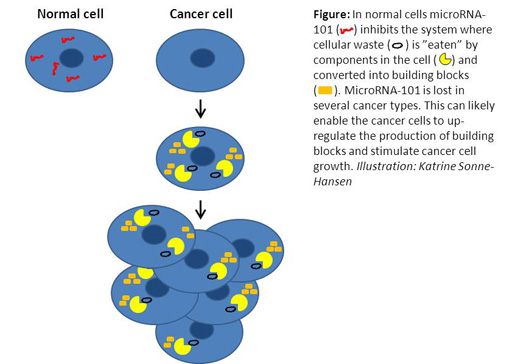Home > Press > Small molecules can starve cancer cells
 |
Abstract:
CANCER RESEARCH
All cells in our body have a system that can handle cellular waste and release building blocks for recycling. The underlying mechanism is called autophagy and literally means "self-eating". Many cancer cells have increased the activity of this system and the increased release of building blocks equip the cancer cells with a growth advantage and can render them resistant towards treatment.
Small molecules can starve cancer cells
Copenhagen, Denmark | Posted on October 9th, 2011"We have discovered a small molecule that can block autophagy in different cancer cells and specifically, this molecule can increase the sensitivity of breast cancer cells towards one of the most commonly used treatments for breast cancer," says Professor Anders H. Lund, at BRIC, University of Copenhagen.
The results have just been published in EMBO Journal: "microRNA-101 is a potent inhibitor of autophagy, Frankel et al."
Our own anti-cancer molecule
The molecule that the researchers have studied is called microRNA-101 and is found naturally in our cells. In cancer research, there is currently a large focus on both autophagy and microRNA molecules, which can control our genes and both mechanisms are known to play an important role for cancer development.
"We have shown that microRNA-101 can turn off specific genes and thereby inhibit autophagy in cancer cells. The fact that microRNA molecules can regulate autophagy is quite new and our results disclose a large and interesting field within cancer research" says researcher Lisa Frankel, who has been leading this research project in Anders H. Lund's laboratory.
Breast cancer treatment
MicroRNA-101 is often lost in liver cancer, prostate cancer and breast cancer. By controlling the level of microRNA-101 in cells of different cancer types, the researchers from BRIC show that microRNA-101 regulates autophagy. In addition, the researchers have shown that breast cancer cells become more sensitive towards treatment with the anti-hormone Tamoxifen, when they via microRNA-101 turn off the autophagy system.
"This result has a clear clinical relevance, as resistance against tamoxifen is a large problem in the treatment of breast cancer," says Anders H. Lund.
The next step of the researchers is to investigate whether other microRNA molecules are involved in the regulation of autophagy in cancer cells. Further, they will take a closer look at the role of microRNA-101 in normal development of our organism and in the development of cancer.
####
For more information, please click here
Contacts:
Professor Anders H. Lund, BRIC
Phone: +45 35325657
Mobile: +45 30662303
E-mail:
Postdoc Lisa Frankel, BRIC
Phone: +45 35325813
E-mail:
Copyright © University of Copenhagen
If you have a comment, please Contact us.Issuers of news releases, not 7th Wave, Inc. or Nanotechnology Now, are solely responsible for the accuracy of the content.
| Related News Press |
News and information
![]() Simulating magnetization in a Heisenberg quantum spin chain April 5th, 2024
Simulating magnetization in a Heisenberg quantum spin chain April 5th, 2024
![]() NRL charters Navy’s quantum inertial navigation path to reduce drift April 5th, 2024
NRL charters Navy’s quantum inertial navigation path to reduce drift April 5th, 2024
![]() Discovery points path to flash-like memory for storing qubits: Rice find could hasten development of nonvolatile quantum memory April 5th, 2024
Discovery points path to flash-like memory for storing qubits: Rice find could hasten development of nonvolatile quantum memory April 5th, 2024
Nanomedicine
![]() New micromaterial releases nanoparticles that selectively destroy cancer cells April 5th, 2024
New micromaterial releases nanoparticles that selectively destroy cancer cells April 5th, 2024
![]() Good as gold - improving infectious disease testing with gold nanoparticles April 5th, 2024
Good as gold - improving infectious disease testing with gold nanoparticles April 5th, 2024
![]() Researchers develop artificial building blocks of life March 8th, 2024
Researchers develop artificial building blocks of life March 8th, 2024
Discoveries
![]() Chemical reactions can scramble quantum information as well as black holes April 5th, 2024
Chemical reactions can scramble quantum information as well as black holes April 5th, 2024
![]() New micromaterial releases nanoparticles that selectively destroy cancer cells April 5th, 2024
New micromaterial releases nanoparticles that selectively destroy cancer cells April 5th, 2024
![]() Utilizing palladium for addressing contact issues of buried oxide thin film transistors April 5th, 2024
Utilizing palladium for addressing contact issues of buried oxide thin film transistors April 5th, 2024
Announcements
![]() NRL charters Navy’s quantum inertial navigation path to reduce drift April 5th, 2024
NRL charters Navy’s quantum inertial navigation path to reduce drift April 5th, 2024
![]() Discovery points path to flash-like memory for storing qubits: Rice find could hasten development of nonvolatile quantum memory April 5th, 2024
Discovery points path to flash-like memory for storing qubits: Rice find could hasten development of nonvolatile quantum memory April 5th, 2024
|
|
||
|
|
||
| The latest news from around the world, FREE | ||
|
|
||
|
|
||
| Premium Products | ||
|
|
||
|
Only the news you want to read!
Learn More |
||
|
|
||
|
Full-service, expert consulting
Learn More |
||
|
|
||








